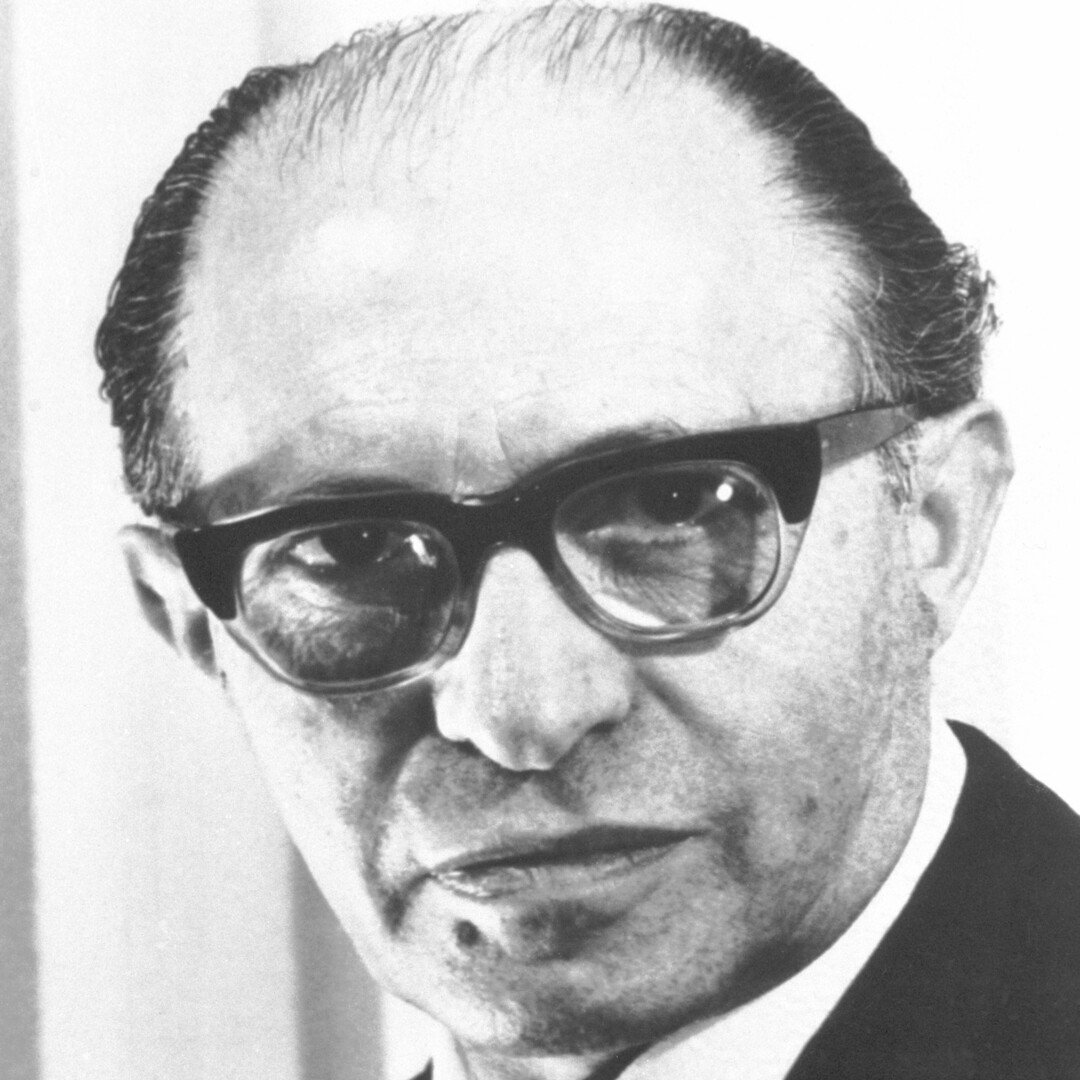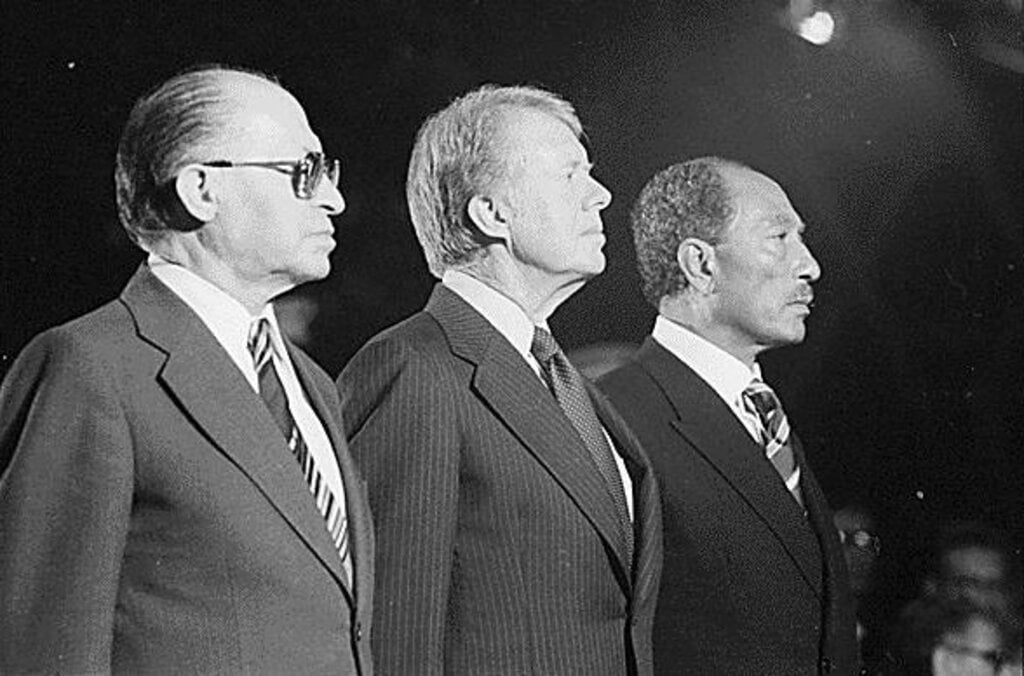Menachem Begin
Speed read
Menachem Begin was awarded the Nobel Peace Prize, jointly with Mohammad Anwar Al-Sadat, for negotiating a peace agreement between Egypt and Israel in 1978.

Full name: Menachem Begin
Born: 16 August 1913, Brest Litovsk, Russian Empire (now Belarus)
Died: 9 March 1992, Tel Aviv, Israel
Date awarded: 27 October 1978
Seeking peace with Egypt
In 1973, Egypt attacked Israel to repossess the Sinai Peninsula, which Israel had seised in 1967. Israel prevailed, but suffered heavy losses. Many Israelis lost their confidence in the ruling Labour Party, and Menachem Begin became prime minister after the 1977 elections. He was one of those who believed that Israel ought to annex all of Palestine. But the USA, Israel’s close ally, also wanted Egypt, the most powerful Arab nation, as an ally. The USA pressured Begin to seek negotiations with Egyptian President Anwar Sadat. Begin himself came to realise that peace with Egypt was more important than retaining the Sinai. In 1978, US President Jimmy Carter brought together the two leaders for talks in the USA. As a result, Begin traded land for peace. Egypt reclaimed the Sinai Peninsula in exchange for full diplomatic recognition of the State of Israel.

"This is our common maxim and belief – that if through your efforts and sacrifices you win liberty and with it the prospect of peace, then work for peace because there is no mission in life more sacred."
Menachem Begin, Nobel Prize lecture, 10 December 1978.
Dreaming of a greater Israel
Menachem Begin grew up in pre-WWII Poland where anti-Semitism was rife. In the 1930s, Begin joined a Zionist organisation whose members believed that Jews had to be willing to use force against the Arabs to create their own state in the Middle East. The state would encompass all the land that had belonged to Israel in biblical times. Begin’s goal was to persuade as many Jews as possible to immigrate to Palestine so they could have a strong enough military force to create their state. Upon defeat, the Palestinians would be given the choice to flee or to submit to Jewish rule.
"The impression made on him by the violent and increasing anti-Semitism nourished in him at an early age the yearning and determination to return to the ancient home of the Jews in Israel."
Aase Lionæs, Chairman of the Nobel Committee, Presentation Speech, 10 December 1978.
Was Begin a terrorist?
Begin made his way to Palestine after Germany’s 1939 invasion of Poland, but most of his family was killed by the Nazis. Begin believed that the British, who were governing Palestine, obstructed Jewish immigration and the creation of a Jewish state. He became the leader of Irgun Zwai Leumi, which fought both the British and the Palestinians. In its struggle, Irgun conducted terrorist attacks on military and civilian targets. The killing of more than 200 Palestinian men, women and children in the village of Deir Yassin in 1948 garnered world attention. Begin did not take part himself, and denied for the rest of his life that Irgun had been involved in a massacre.
| Irgun Zwei Leumi Hebrew for “national military organisation.” Jewish organisation founded in 1931. Starting in 1937, Irgun used force against the Arabs and British in Palestine to achieve its goal of the creation of a Jewish state. Dissolved in 1948. |
"What is perhaps especially perplexing and painful is that Begin, so sensitive and attuned to the woes and sufferings of the Jewish people, could never extend that empathy to the Arabs, his foes."
Amus Perlmutter, The Life and Times of Menachem Begin', Page 217, Doubleday, Garden City, New York 1987.'
Demonstrations against the peace prize
Menachem Begin was a controversial person. Many disliked him for his enduring dream of a greater Israel encompassing all of Palestine, and for his leadership in the 1940s of a Zionist organisation in Palestine which had used terror to realise its aims. The Norwegian left indicated plans for large-scale demonstrations, so the Nobel Peace Prize ceremony was held at Akershus Castle, to which Begin was flown by helicopter directly after a reception at the Royal Palace. The peace prize was awarded in the castle hall while the police clashed with demonstrators outside.
Invasion of Lebanon in 1982
Menachem Begin made peace with Egypt in 1978, but four years later he ordered an Israeli invasion of Lebanon with the aim of disabling the Palestinian Liberation Organisation (PLO), which used the country as a base from which to launch guerrilla attacks on Israel. The Israelis reached as far north as Beirut, which they bombed heavily. PLO leader Yasser Arafat fled by ship to Tunisia, but several hundred Palestinian civilians in two refugee camps were massacred by Israel’s Lebanese allies. The invasion was condemned internationally and a year later an embittered Begin withdrew from political life.
| PLO The Palestinian Liberation Organisation, founded in Egypt in 1964. In 1974, it was recognised by the Arab countries as “the sole legitimate representative of the Palestinian people,” and was granted observer status at the UN. It was recognised by Israel in 1993. |
| Massacre Term originally meaning slaughterhouse, commonly used today to denote the murder of many people at the same time – a bloodbath. |
Learn more
Menachem Begin was born in Brest-Litovsk, Poland on 16 August 1913, son of Zeev-Dov and Hassia Begin. He was educated at the Mizrachi Hebrew School and the Polish Gymnasium (High School). In 1931, he entered Warsaw University and took his law degree in 1935 ...
Disclaimer: Every effort has been made by the publisher to credit organisations and individuals with regard to the supply of photographs. Please notify the publishers regarding corrections.
Nobel Prizes and laureates
Six prizes were awarded for achievements that have conferred the greatest benefit to humankind. The 12 laureates' work and discoveries range from proteins' structures and machine learning to fighting for a world free of nuclear weapons.
See them all presented here.
